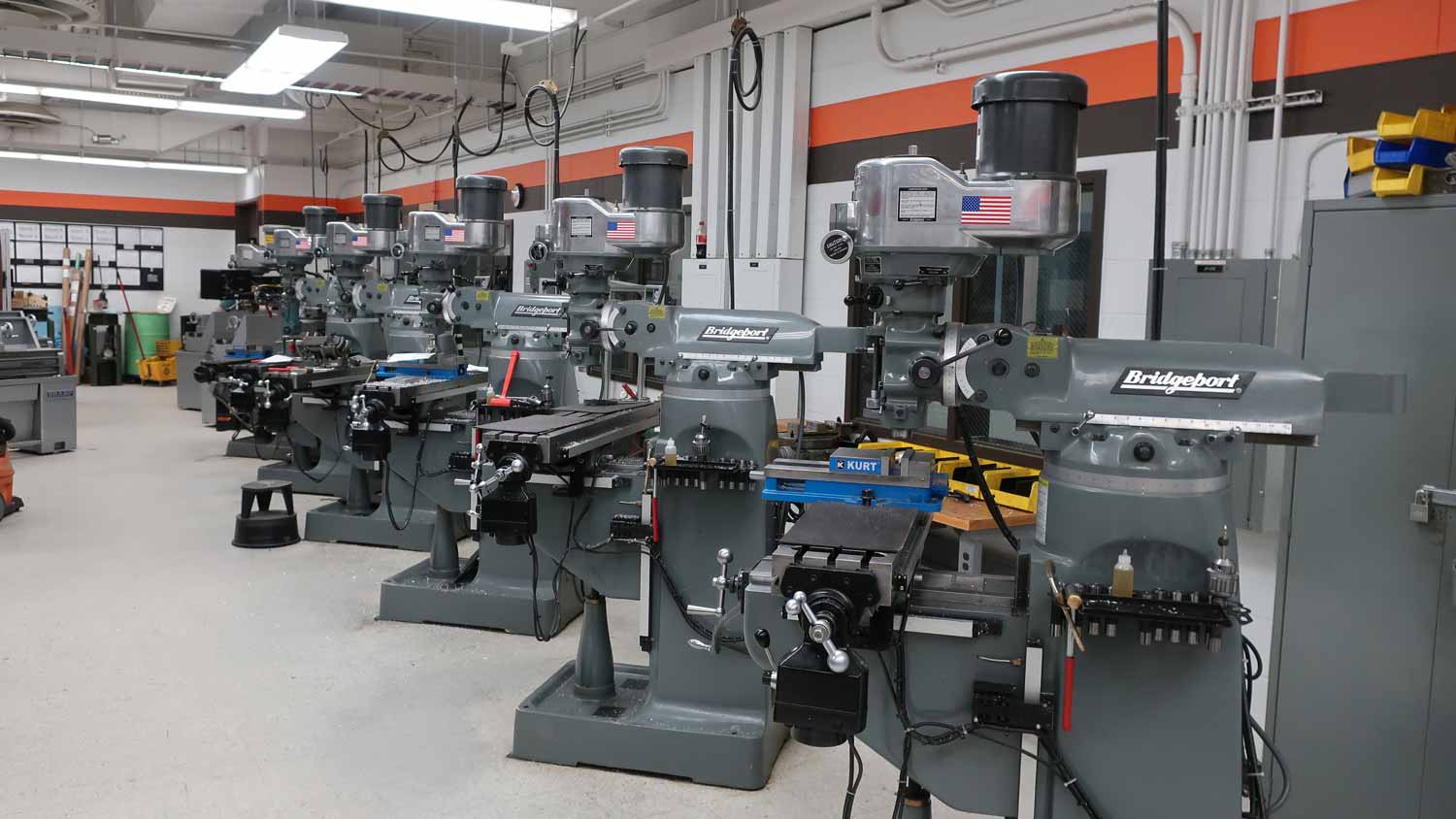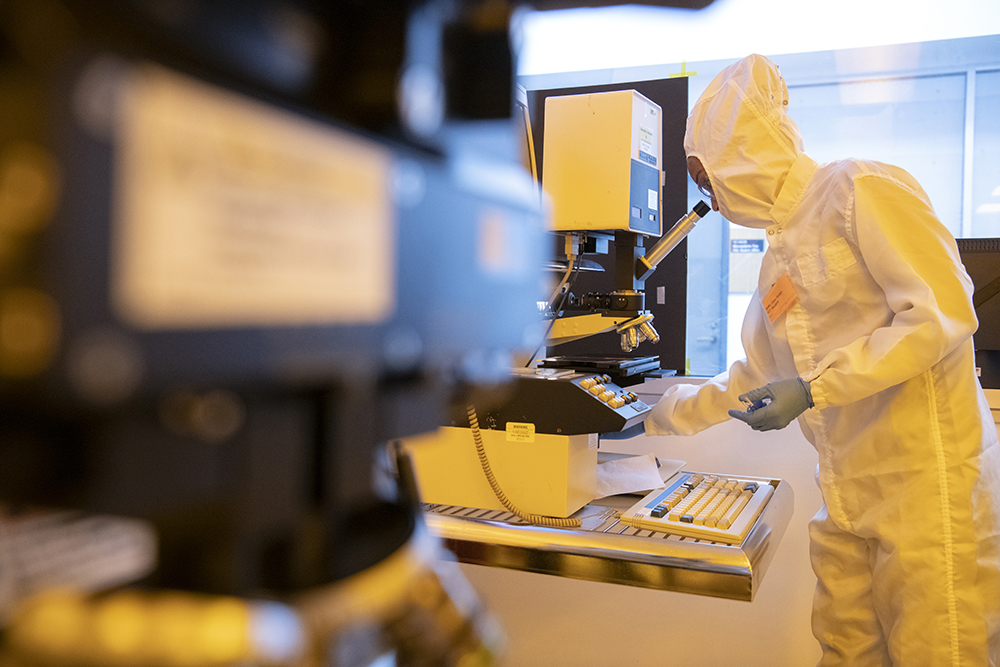Microelectronics Manufacturing Engineering Master of Engineering Degree
- RIT /
- Rochester Institute of Technology /
- Academics /
- Microelectronics Manufacturing Engineering ME
Engineer the world of microelectronics with an ME program in Microelectronics Manufacturing Engineering. Innovate at the microscale.
Overview for Microelectronics Manufacturing Engineering ME
This program is no longer accepting new student applications.
Students interested in studying in this field should refer to the MS program in microelectronic engineering.
Loading...
Curriculum for 2024-2025 for Microelectronics Manufacturing Engineering ME
Current Students: See Curriculum Requirements
Microelectronic Manufacturing Engineering, ME degree, typical course sequence
| Course | Sem. Cr. Hrs. | |
|---|---|---|
| First Year | ||
| MCEE-601 | Microelectronic Fabrication |
3 |
This course introduces the beginning graduate student to the fabrication of solid-state devices and integrated circuits. The course presents an introduction to basic electronic components and devices, lay outs, unit processes common to all IC technologies such as substrate preparation, oxidation, diffusion and ion implantation. The course will focus on basic silicon processing. The students will be introduced to process modeling using a simulation tool such as SUPREM. The lab consists of conducting a basic metal gate PMOS process in the RIT clean room facility to fabricate and test a PMOS integrated circuit test ship. Laboratory work also provides an introduction to basic IC fabrication processes and safety. (Prerequisites: Graduate standing in the MCEE-MS or MCEMANU-ME program or permission of instructor.) Lab 3, Lecture 3 (Fall). | ||
| MCEE-602 | Semiconductor Process Integration |
3 |
This is an advanced level course in Integrated Circuit Devices and process technology. A detailed study of processing modules in modern semiconductor fabrication sequences will be done through simulation. Device engineering challenges such as shallow-junction formation, fin FETs, ultra-thin gate dielectrics, and replacement metal gates are covered. Particular emphasis will be placed on non-equilibrium effects. Silvaco Athena and Atlas will be used extensively for process simulation. Graduate paper required. (Prerequisites: MCEE-601 or equivalent course.) Lab 2, Lecture 3 (Spring). | ||
| MCEE-603 | Thin Films |
3 |
This course focuses on the deposition and etching of thin films of conductive and insulating materials for IC fabrication. A thorough overview of vacuum technology is presented to familiarize the student with the challenges of creating and operating in a controlled environment. Physical and Chemical Vapor Deposition (PVD & CVD) are discussed as methods of film deposition. Plasma etching and Chemical Mechanical Planarization (CMP) are studied as methods for selective removal of materials. Applications of these fundamental thin film processes to IC manufacturing are presented. Graduate paper required. (Prerequisites: Graduate standing in the MCEE-MS or MCEMANU-ME program or permission of instructor.) Lab 3, Lecture 2 (Fall). | ||
| MCEE-605 | Lithography Materials and Processes |
3 |
Microlithography Materials and Processes covers the chemical aspects of microlithography and resist processes. Fundamentals of polymer technology will be addressed and the chemistry of various resist platforms including novolac, styrene, and acrylate systems will be covered. Double patterning materials will also be studied. Topics include the principles of photoresist materials, including polymer synthesis, photochemistry, processing technologies and methods of process optimization. Also advanced lithographic techniques and materials, including multi-layer techniques for BARC, double patterning, TARC, and next generation materials and processes are applied to optical lithography. Graduate paper required. (Prerequisites: Graduate standing in the MCEE-MS or MCEMANU-ME program or permission of instructor.) Lab 3, Lecture 3 (Fall, Spring). | ||
| MCEE-615 | Nanolithography Systems |
3 |
An advanced course covering the physical aspects of micro- and nano-lithography. Image formation in projection and proximity systems are studied. Makes use of optical concepts as applied to lithographic systems. Fresnel diffraction, Fraunhofer diffraction, and Fourier optics are utilized to understand diffraction-limited imaging processes and optimization. Topics include illumination, lens parameters, image assessment, resolution, phase-shift masking, and resist interactions as well as non-optical systems such as EUV, maskless, e-beam, and nanoimprint. Lithographic systems are designed and optimized through use of modeling and simulation packages. Graduate paper required. (Prerequisites: MCEE-605 or equivalent course.) Lab 3, Lecture 3 (Fall, Spring). | ||
| MCEE-732 | Microelectronics Manufacturing |
3 |
This course focuses on CMOS manufacturing. Topics include CMOS process technology, work in progress tracking, CMOS calculations, process technology, long channel and short channel MOSFET, isolation technologies, back-end processing and packaging. Associated is a lab for on-campus section (01) and a graduate paper/case study for distance learning section (90). The laboratory for this course is the student-run factory. Topics include Lot tracking, query processing, data collection, lot history, cycle time, turns, CPK and statistical process control, measuring factory performance, factory modeling and scheduling, cycle time management, cost of ownership, defect reduction and yield enhancement, reliability, process modeling and RIT's advanced CMOS process. Silicon wafers are processed through an entire CMOS process and tested. Students design unit processes and integrate them into a complete process. Students evaluate the process steps with calculations, simulations and lot history, and test completed devices. (Prerequisites: MCEE-601 or equivalent course.) Lecture 8 (Spring). | ||
| MCEE-795 | Microelectronics Research Methods |
2 |
Weekly seminar series intended to present the state of the art in microelectronics research. Other research-related topics will be presented such as library search techniques, contemporary issues, ethics, patent considerations, small business opportunities, technical writing, technical reviews, effective presentations, etc. (Prerequisites: Graduate standing in the MCEE-MS or MCEMANU-ME program or permission of instructor.) Seminar 1 (Fall). | ||
| Choose one of the following: | 3 |
|
| MCEE-777 | Master of Engineering Internship |
|
This course number is used to fulfill the internship requirement for the master of engineering degree program. The student must obtain the approval of the department head before registering for this course. (Enrollment in this course requires permission from the department offering the course.) Internship (Fall, Spring, Summer). | ||
Graduate Elective |
||
| Second Year | ||
| MCEE-795 | Microelectronics Research Methods |
1 |
Weekly seminar series intended to present the state of the art in microelectronics research. Other research-related topics will be presented such as library search techniques, contemporary issues, ethics, patent considerations, small business opportunities, technical writing, technical reviews, effective presentations, etc. (Prerequisites: Graduate standing in the MCEE-MS or MCEMANU-ME program or permission of instructor.) Seminar 1 (Fall). | ||
Graduate Electives |
6 | |
| Total Semester Credit Hours | 30 |
|
Note for online students
The frequency of required and elective course offerings in the online program will vary, semester by semester, and will not always match the information presented here. Online students are advised to seek guidance from the listed program contact when developing their individual program course schedule.










